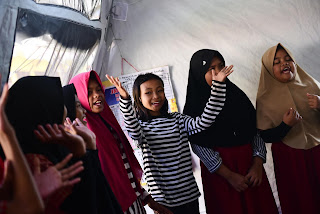By: Arie Rukmantara - Chief Field Office,
Programme/Operation Section, Surabaya
After
successfully immunizing 9 million children against Measles and Rubella in Java
last year, East Java Provincial Administration and UNICEF are involved in
another massive immunization campaign in East Java. The provincial
administration aims to immunize 11 million children from 1 to 19-year-old
against diphtheria. The drive is called Outbreak Response Immunization (ORI)
against Diphtheria. Last year, the province recorded an outbreak that killed
more than 10 people, mostly children.
This time the
challenge gets greater. Not only the target population is getting larger, but
the campaign requires the same child to be vaccinated three times throughout
the year 2018. The first vaccination is sometime between February and March,
the second is between June and July, the final one is ongoing: November to
December.
However, the
forces behind the campaign is also getting bigger. Building up from the
momentum of last year’s Measles and Rubella campaign’s success that gained full
support of, among others, media company Jawa Pos Group, Indonesia’s largest
Muslim organization Nahdlatul Ulama, the East Java Council of Ulemas,
University of Airlangga, this time the immunization drive is more members to
join the band: Entrepreneurs Organization of Indonesia East. The organization
consists 13,000 young businesspeople who employ around 3.4 million workers.
Getting more
and more excited and determined, on Thursday, 15 November 2018, the Provincial
Health Office of East Java, Airlangga University and UNICEF field office in
Surabaya, called on everyone, including the mayors and heads of districts
across the province to ensure the success of final round of Outbreak Response
Immunization on Diphtheria. The first and second rounds had managed to
vaccinate over 10,5 million children or 95% of the target.
The commitment
was made on Thursday and was also witnessed by a well-known economist and
statistician from Technology Institute of Surabaya, Mr. Kresnayana Yahya. His
presentation, based on health data he gathered in the last two years, convinced
the business audience that investing in child health promise high returns.
Airlangga
University also appraised the Head of Trenggalek District Dr. Emil Dardak. The
incoming vice governor, and his wife, a well-known artist Arumi Bachsin, played
a vital role in ensuring the success of 2017 Measles and Rubella immunization.
For his consistency in promoting child health Airlangga University call the
vice governor elect as “Bupati Sahabat Anak”. Deputy Representative UNICEF to
Indonesia, Robert Gass, handed the appreciation certificate to Dr. Emil
witnessed by Head of PHO, Dr. Kohar Hari Santoso.




































